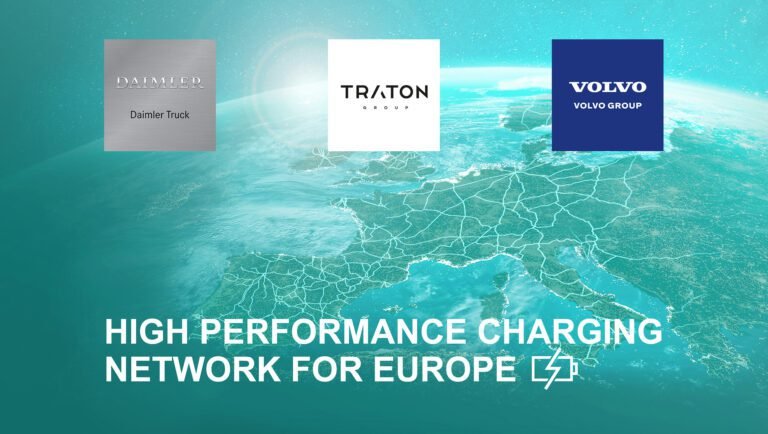Volvo Group, Daimler Trucks and Volkswagen’s heavy-duty truck group Traton on Monday announced a non-binding agreement to build a network of high-performance public charging stations for long-distance heavy-duty electric trucks and buses across Europe. Reuters first published the news.
The three major European automakers will invest €500 million (about US$593 million) to install and operate 1,700 charging points in strategic locations and close to motorways. They intend to finalize the agreement by the end of this year and begin operations next year, with the hope of significantly increasing the number of charging points as the companies look for additional partners for future joint venture.
This project is meant to be a catalyst to prepare for the EU’s goals of zero-carbon freight transport by 2050. One of the main barriers for both individuals and charging companies to switch to electric vehicles has historically been the lack of charging infrastructure. By building this infrastructure, Volvo, Daimler and Traton can also expect to increase their sales of electric trucks and buses.
“The common goal of European truck manufacturers is to achieve climate neutrality by 2050,” Martin Daum, CEO of Daimler Truck, said in a statement. “However, it is crucial that building the right infrastructure goes hand in hand with putting zero CO2 trucks on the road. Together with the Volvo Group and the Traton Group, we are very excited to take this pioneering step to create a high-performance charging network across Europe.” .
The partnership between Volvo and Daimler is not unprecedented. In May, the two rival companies teamed up to produce hydrogen fuel cells for long-range trucks to cut development costs and increase production volume. This latest project is another sign that major companies are banding together to solve climate-related issues in the industry.
European Automotive Industry Association ACEA has called for up to 50,000 high-performance charging points by 2030. Nearly 10 billion euros are needed to build infrastructure in Europe to be fully electrified by 2050, Traton CEO Matthias Gründler told Reuters.
According to a statement from Volvo, this project is also a call to action for others with a stake in the industry, such as automakers or governments, to work together to ensure the rapid expansion needed to reach climate goals.
The charging stations will be independent of the brand, and battery electric vehicle fleet operators will be able to use fast charging during the European mandatory 45-minute rest period for long-distance transport as well as overnight charging.
The joint venture will operate under its own corporate identity outside Amsterdam. Volvo, Daimler and Traton will have equal shares in the project, but will continue to compete in all other areas.
VW’s Traton Group has struck a deal with TuSimple to develop self-driving trucks





